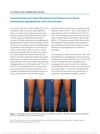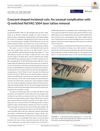Search
for
Sort by
Research
60-90 / 307 results
research Fractional Resurfacing and Topical Bimatoprost for the Treatment of Laser-Induced Postinflammatory Hypopigmentation on the Lower Extremities
The combination therapy improved skin pigmentation.

research Crescent-Shaped Incisional Cuts: An Unusual Complication with Q-Switched Nd:YAG 1064 Laser Tattoo Removal
A man got unusual crescent-shaped cuts from a laser tattoo removal due to a laser technical issue, but healed without scars.

research Ablative Fractional Resurfacing in Topical Drug Delivery: An Update and Outlook
Ablative fractional resurfacing could improve how well topical drugs penetrate the skin, but more research is needed to fine-tune the method.

research Home-Use Laser and Light Devices for the Skin: An Update
At-home laser and light skin devices are less effective than professional ones, with limited scientific evaluation, but some show promise for wrinkles, hair growth, and acne.

research Noncoding dsRNA Induces Retinoic Acid Synthesis to Stimulate Hair Follicle Regeneration via TLR3
Noncoding dsRNA boosts hair growth by activating TLR3 and increasing retinoic acid.

research Light Emitting Diodes Technology-Based Photobiomodulation Therapy for Dermatology and Aesthetics: Recent Applications, Challenges, and Perspectives
LED light therapy is effective for skin and hair treatments but requires careful use to minimize risks.

research Hypothesis: Wound-Induced TLR3 Activation Stimulates Endogenous Retinoic Acid Synthesis and Signalling During Regeneration
Activating TLR3 may help produce retinoic acid, important for tissue regeneration.

research Low-Level Light Therapy for Cosmetics and Dermatology
Low-Level Light Therapy is effective for skin rejuvenation, wound healing, and hair growth, with mild side effects.

research The Effects of Multiple Power Densities of Carbon Dioxide Laser on Photothermal Damage in Rat Skin Tissue
Higher power CO2 laser causes more severe skin burns and damage.

research Updated Management of Atrophic Post-Acne Scars: Review Article
Combination therapies work better than single treatments for atrophic acne scars.

research Platelet-Rich Plasma in Dermatology: Boon or Bane?
Platelet-rich plasma might help with hair growth and skin conditions, but more research is needed to prove its effectiveness and safety.

research Systematic Review of the Use of Platelet-Rich Plasma in Aesthetic Dermatology
Platelet-rich plasma may help with hair growth and skin quality but more research is needed to confirm its effectiveness.

research Androgenetic Alopecia: An Update Of Treatment Options
Minoxidil is the only FDA-approved topical drug for treating male or female pattern hair loss, and other medications like finasteride and dutasteride can also increase hair growth.

research Applications of Platelet-Rich Plasma in Dermatology: A Critical Appraisal of the Literature
Platelet-rich plasma may have some benefits in dermatology, but there's not enough evidence to widely recommend its use.

research Functional Complexity of Hair Follicle Stem Cell Niche and Therapeutic Targeting of Niche Dysfunction for Hair Regeneration
Understanding how hair follicle stem cells work can help find new ways to prevent hair loss and promote hair growth.

research Differences in Perceptions of Beauty and Cosmetic Procedures in Ethnic Patients
The cosmetic industry should adapt to the varied beauty standards of ethnic groups and offer specialized treatments.

research Photobiomodulation: The Clinical Applications of Low-Level Light Therapy
Low-Level Light Therapy (LLLT) is a safe and effective method for skin rejuvenation, acne treatment, wound healing, body contouring, and hair growth, but more well-designed trials are needed for confirmation.

research The Use of Photodynamic Therapy for Treatment of Acne Vulgaris
Photodynamic Therapy is an effective treatment for mild to severe acne.

research A Review of Hand-Held, Home-Use Cosmetic Laser and Light Devices
Home-use cosmetic laser and light devices show modest results for hair removal and acne treatment, but more research is needed for confirmation.

research An Intrinsic Oscillation of Gene Networks Inside Hair Follicle Stem Cells: An Additional Layer That Can Modulate Hair Stem Cell Activities
Gene network oscillations inside hair stem cells are key for hair growth regulation and could help treat hair loss.

research Literature Review of Cosmetic Procedures in Men: Approaches and Techniques Are Gender Specific
Men prefer less invasive cosmetic procedures and need different treatment approaches than women.

research Systematic Review of the Therapeutic Roles of Adipose Tissue in Dermatology
Fat tissue treatments may help with wound healing and hair growth, but more research with larger groups is needed to be sure.

research The Effects of Narrowbands of Visible Light Upon Some Skin Disorders: A Review
Visible light can improve skin disorders and hair loss, but more research is needed to understand long-term effects.

research A Meta-Analysis of the Evidence for Assisted Therapy with Platelet-Rich Plasma for Atrophic Acne Scars
Platelet-rich plasma therapy helps improve atrophic acne scars.

research Chemical Peels: Indications and Special Considerations for the Male Patient
Chemical peels are effective and popular for treating men's skin issues, with some special considerations for their unique skin needs.

research Dermatologic Care of Sexual and Gender Minority/LGBTQIA Youth, Part 2: Recognition and Management of the Unique Dermatologic Needs of SGM Adolescents
Pediatric dermatologists need to understand the unique skin health needs of LGBTQIA youth to provide better care.

research Efficacy of 1,550-nm Erbium-Glass Fractional Laser Treatment and Its Effect on the Expression of Insulin-Like Growth Factor 1 and Wnt/β-Catenin in Androgenetic Alopecia
Laser treatment improves hair density and increases growth factors in androgenetic alopecia.

research Updates in the Understanding and Treatments of Skin and Hair Disorders in Women of Color
New treatments for skin and hair disorders in women of color address unique biological differences and include specific acne medications, sunscreens, skin lighteners, and hair care adjustments.

research Home-Based Devices in Dermatology: A Systematic Review of Safety and Efficacy
Home-based skin care devices are generally safe and effective for hair removal, promoting hair growth, treating wrinkles and acne, but results for psoriasis treatment are mixed.